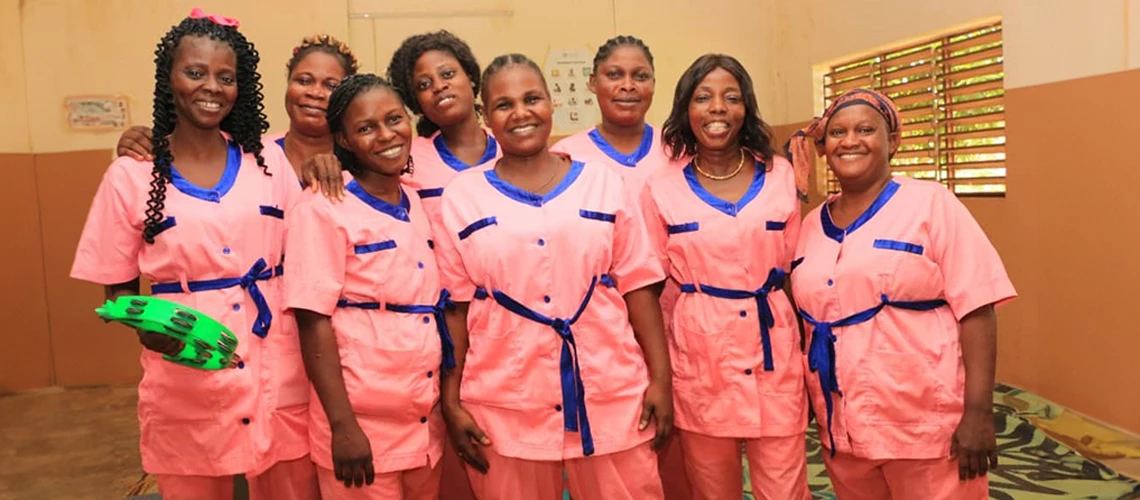NEWS

BY Saint-Martin Kodjovi Mongan Agbeshie, Rachael Pierotti, Nicola Duell, & Claudia Rivas
October 24, 2024
It’s early morning in Benin and Solange, a young mother, is dropping her child off at one of the several new daycare centers before heading to her job maintaining solar lamps. Just a few years ago, she was like many other women in the country who could not work because she lacked formal training or access to childcare. But today, with support from the Benin Azôli program, she is working alongside other women from her village in a pioneering field dominated by men.
Social norms often push girls like Solange to drop out of school, marry earlier, and take the burden of domestic chores. In Benin, one in three working-age women are still unable to work and earn a living. Among women who are able to participate in the labor force, eight in 10 report being underemployed compared to six in 10 men. Without the proper skills, women consistently end up in lower-paying jobs that pay half the wages earned by men.
This pervasive cycle perpetuates gender inequalities, exacerbates women’s vulnerabilities, and hinders their participation in the economy.
Photo Caption: Group of local women and mothers trained to provide childcare services at community-based facilities. Credit: ANPE

“The pathway to employment”
To address unemployment and underemployment among women and youth with little or no access to education, Benin’s National Employment Agency (ANPE) introduced the gender-responsive employment program ‘Azôli’ as part of the World Bank’s Youth Inclusion Project.
Since its national rollout in October 2021, Azôli, which means, “the pathway to employment” in the Fon language, reached nearly 34,000 Beninese youth, of which 51% are women. This represents a major improvement compared to a 40% female participation in previous employment programs.
To empower women, Benin worked with the Partnership for Economic Inclusion (PEI)—a global platform hosted by the World Bank that unites NGOs, UN agencies, research institutions, and funding partners—to adopt and scale up economic inclusion programs that help vulnerable people lift themselves out of extreme poverty.
Three gender-responsive innovations used in the program are generating new lessons on how to empower women and increase economic inclusion.
1. Introducing childcare services so mothers can participate
After analyzing why young women aren’t engaging in wage employment, the program introduced childcare services for participants, which was particularly helpful for young mothers who wanted to work and participate in apprenticeships.
By the end of June 2024, 18 community-based childcare facilities (Espaces Communautaires d’Accueil des Enfants, or ECAE) were established to support the program, with local mothers trained as providers. The ECAE has welcomed 197 infants aged between four months and three years old. For young mothers like Solange, this was a major turning point.
“Without the childcare facility, it would have been almost impossible for me to participate in training sessions. I couldn't have my child on my back, look after her, and assimilate the teachings,” Solange told us.
The program also included awareness raising activities on gender inequalities, referral mechanisms for people facing gender-based violence, and training materials that were developed in partnership with Benin’s Ministry of Social Affairs and Microfinance.
2. Equipping governments to tackle gender inequality
Women are often subject to social norms and gender discrimination in the job market. Equipping government agents with tools and knowledge about gender equity issues can help create awareness and long-lasting change.
Capacity-building sessions were organized for both ANPE and municipal employees to help them support Azôli participants effectively. The 16 hour-training program included sessions on the labor market, employment policies, information and counselling for jobseekers, relations with employers, managing partnerships, and gender equity issues.
The agents learned how to address the employment barriers women face, including the lack of access to a bank account, restrictions from husbands or parents, limited childcare support, among others. After the training, one local employment agent said: “There are aspects of gender specificity that I was unaware of before the training. I'm now better equipped to assist and advise young people in my locality.”
The grant also supported the development of a new operation manual and the adaptation of training modules to meet the needs of vulnerable youth, with little or no education.
3. Incorporating participant feedback into the delivery process
One year into the program, a survey and study were used to inform adaptations to support the journey of vulnerable young women in employment.
The findings show that youth, particularly women, with little to no education are often uncomfortable expressing themselves and their employment goals. “You have to give them a chance and build up their confidence first, before they realize that they're capable,” said one employer when describing young women candidates.
However, not all employers are strong mentors who can help build self-confidence among their employees. To address this challenge, the program team is working with the ANPE to update the life and employment skills training and make them widely available. The content for these training programs builds on a previous youth employment project, which proved to be highly effective at promoting income growth among women.
A small start with big potential
Reducing gender inequalities and improving women’s access to better jobs is a long-term process needing multipronged initiatives on a large scale. The Azôli program has shown that identifying and addressing the specific barriers that vulnerable women face through regular feedback and data collection can support this process. Similarly, building government capacity is crucial to foster agency and ensure that local staff can support women more effectively.
The support of partners is also key. PEI’s grant and technical assistance helped pave the way by generating evidence and knowledge and translating it into action through ANPE, in collaboration with other government agencies, employers, workers' associations, and development partners. A small start, but one with a lot of potential can enable ANPE to sustainably advance the gender equality agenda in Benin.
This article originally appeared on the World Bank Nasikiliza blog.